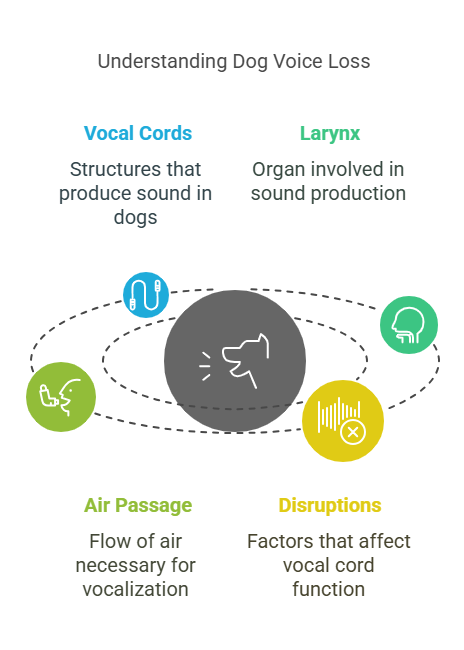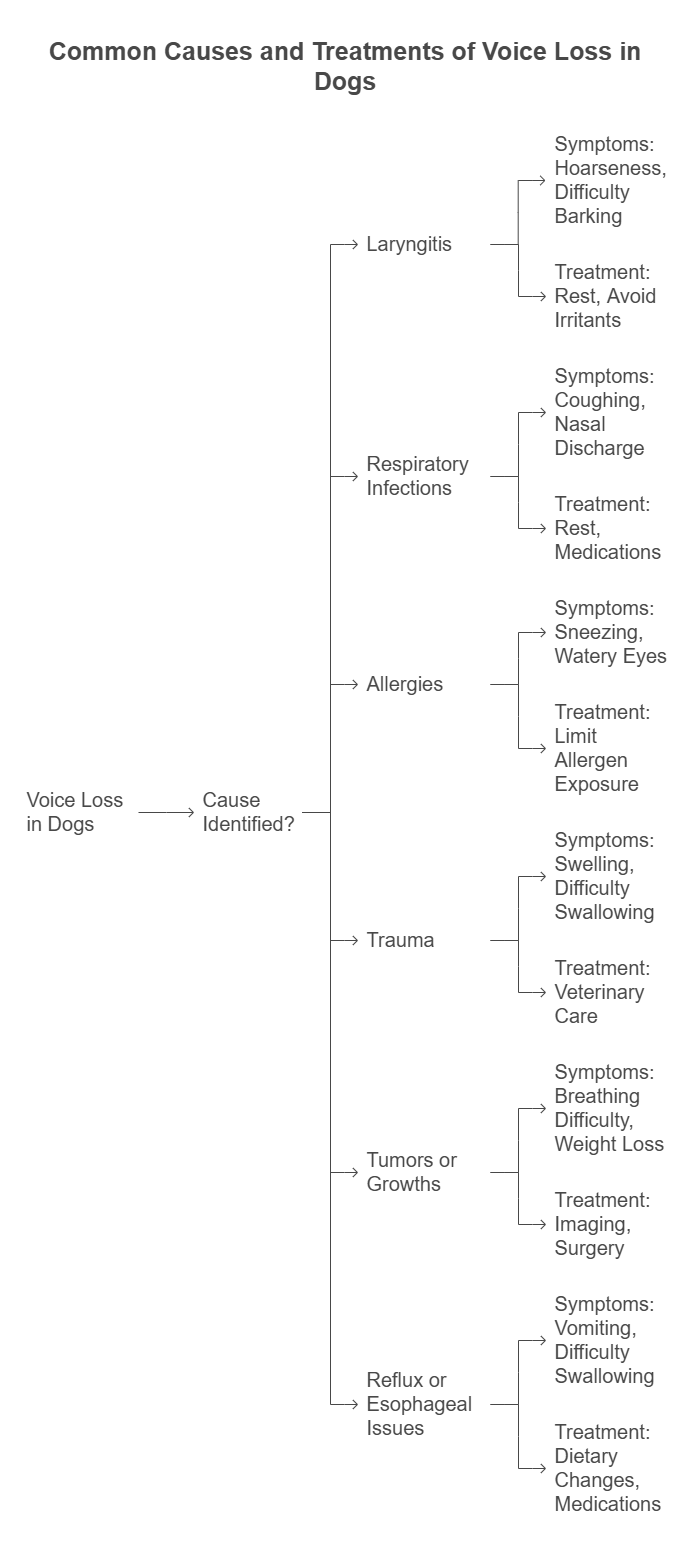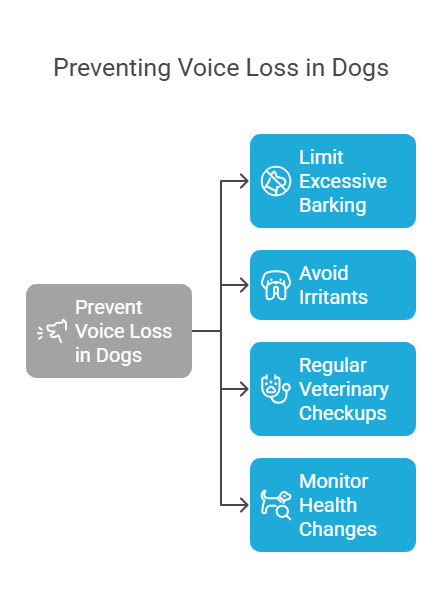Yes, dogs can lose their voice. Dogs are our loyal companions, always ready to bark, whine, or whimper. They communicate through their voice, expressing emotions, excitement, and even warnings. But what if your dog suddenly stops vocalizing or seems unable to bark? Can dogs lose their voice? The answer is yes, they can. Various factors can cause a dog to lose its voice, from temporary conditions to serious health issues. Understanding these causes, recognizing the symptoms, and knowing when to seek professional help are essential for every dog owner.
In this article, we will explore everything you need to know about dogs losing their voice, from common causes to treatment options. Let’s dive in.
What Does It Mean When a Dog Loses Its Voice?
When we say a dog has “lost its voice,” it usually refers to a temporary inability to bark, whine, or make other vocalizations. Unlike humans who might lose their voice due to a sore throat, dogs can experience voice loss for different reasons.
A dog’s voice, which includes barking and whining, comes from its vocal cords. These cords, located in the larynx, vibrate when air passes through them, creating sound. If something disrupts the normal function of the larynx or vocal cords, a dog’s voice may sound weak, hoarse, or completely silent.
Common Causes of Voice Loss in Dogs
Many reasons could explain why your dog isn’t barking like it used to. Some of these causes are harmless and temporary, while others could indicate a serious health problem. Below are some common causes of voice loss in dogs:
1. Laryngitis
Laryngitis is one of the most common causes of voice loss in dogs. It occurs when the larynx (voice box) becomes inflamed, often as a result of excessive barking, a cold, or an infection.
Laryngitis typically happens after your dog has been barking excessively or has been exposed to irritants like smoke, dust, or allergens. The inflammation can lead to hoarseness or a complete loss of the dog’s voice.
Symptoms:
- Hoarse bark or whining
- Difficulty barking or no sound at all
- Coughing or throat clearing
- Panting or labored breathing
Treatment:
Most cases of laryngitis resolve on their own. Ensure your dog gets plenty of rest and avoid any triggers like dust or smoke. If symptoms persist, consult your veterinarian.
2. Respiratory Infections
Respiratory infections, like kennel cough or canine influenza, can lead to voice loss. These infections can affect the throat and larynx, causing inflammation and discomfort.
A dog with a respiratory infection may also show signs of coughing, sneezing, and nasal discharge.
Symptoms:
- Dry, hacking cough
- Nasal discharge or sneezing
- Loss of appetite
- Lethargy
Treatment:
Treatment for respiratory infections often includes rest, fluids, and medications to reduce inflammation or treat any underlying bacterial infection. In severe cases, hospitalization may be required.
3. Allergies
Dogs, like humans, can suffer from allergies that affect their respiratory system. Environmental allergens such as pollen, dust mites, or mold can irritate the throat and cause voice loss.
Symptoms:
- Sneezing or sniffling
- Watery eyes
- Itchy skin
- Hoarseness or silent barking
Treatment:
To manage allergies, try to limit exposure to known allergens. If symptoms persist, your veterinarian may recommend antihistamines or other medications to control the reaction.
4. Trauma to the Throat or Neck
Any physical trauma to a dog’s neck, such as a fall, car accident, or rough handling, can damage the vocal cords or the surrounding structures, leading to voice loss.
Symptoms:
- Difficulty barking
- Coughing or gagging
- Swelling or tenderness around the neck area
- Drooling or trouble swallowing
Treatment:
If you suspect trauma, it’s important to seek immediate veterinary care. Depending on the severity of the injury, treatment may range from pain management to surgery.
5. Tumors or Growths in the Larynx
In rare cases, tumors or growths in the larynx can cause voice loss. These growths can be benign or malignant, and they might block the vocal cords or the airways. Tumors in the throat can cause your dog’s bark to sound different or cause complete voice loss.
Symptoms:
- Difficulty breathing or noisy breathing
- Coughing or gagging
- Hoarseness or complete voice loss
- Weight loss or loss of appetite
Treatment:
If a tumor is suspected, your veterinarian may recommend imaging tests such as X-rays or a CT scan. Surgery or other treatments may be required depending on the nature of the growth.
6. Reflux or Esophageal Issues
Just like humans, dogs can suffer from acid reflux or other esophageal conditions that can lead to inflammation of the throat and voice box. This condition may be caused by an underlying gastrointestinal problem.
Symptoms:
- Coughing or gagging
- Hoarse or silent bark
- Difficulty swallowing
- Vomiting or regurgitation
Treatment:
Managing reflux often involves dietary changes, medications, and possibly weight management to reduce the frequency of reflux episodes.
How to Know If Your Dog Needs Medical Attention
While many causes of voice loss in dogs are temporary, some may require medical attention. If your dog’s voice loss persists for more than a few days or is accompanied by other concerning symptoms, it’s essential to consult a veterinarian.
Seek veterinary care if your dog shows any of the following:
- Persistent voice loss that doesn’t improve
- Difficulty breathing
- Loss of appetite or weight loss
- Coughing or gagging that doesn’t stop
- Signs of pain or distress
A veterinarian will be able to determine the underlying cause of your dog’s voice loss and recommend the appropriate treatment.
Can Dogs Lose Their Voice Permanently?
In some cases, dogs can experience permanent voice loss, especially if the vocal cords or larynx are severely damaged. Tumors, nerve damage, or chronic inflammation can lead to permanent changes in a dog’s voice. However, this is rare, and most dogs who lose their voice will recover with the proper treatment.
Preventing Voice Loss in Dogs
While not all cases of voice loss in dogs can be prevented, there are some steps you can take to reduce the risk:
- Limit excessive barking: If your dog tends to bark excessively, try to manage the situation by providing more mental and physical stimulation to prevent boredom.
- Avoid irritants: Keep your dog away from smoke, dust, and other environmental allergens that can irritate the throat.
- Regular veterinary checkups: Regular visits to the vet can help catch any underlying health issues early on.
- Monitor your dog’s health: If you notice any changes in your dog’s behavior, appetite, or vocalizations, take them to the vet for a checkup.
Bottom Line
Can dogs lose their voice? Yes, they can. Various factors can lead to temporary or even permanent voice loss in dogs. While some causes are simple and easy to treat, others may require veterinary intervention. By being aware of the signs, understanding potential causes, and seeking timely medical care, you can ensure your dog stays happy and healthy.
FAQs
-
What should I do if my dog suddenly loses its voice? If your dog loses its voice suddenly, observe for other symptoms like coughing or difficulty breathing. If the symptoms last more than 24-48 hours, seek veterinary advice.
-
Can a dog lose its voice from barking too much? Yes, excessive barking can cause laryngitis, leading to hoarseness or temporary loss of voice.
-
Are respiratory infections the only reason a dog loses its voice? No, other causes such as trauma, tumors, and allergies can also result in voice loss.
-
How long does it take for a dog to regain its voice? Recovery time depends on the cause. Simple conditions like laryngitis might take a few days to resolve, while more severe issues may take longer.
-
Can voice loss in dogs be prevented? Limiting excessive barking, avoiding irritants, and maintaining regular vet checkups can help prevent voice loss.




